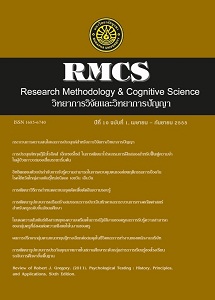โมเดลความสัมพันธ์เชิงสาเหตุความเครียดในการปฏิบัติงานของครูและการรับรู้ความสามารถของกลุ่มครู ที่ส่งผลต่อความพึงพอใจในงานครู
Main Article Content
Abstract
A Causal Relationship Model of Stress on Work and Collective Efficacy Affecting Teacher Job Satisfaction
Pichet Poomjang1, Supim Sripunvoraskul2 and Poonpong Suksawang2
1Assumption College Sriracha, Chon Buri, Thailand
2College of Research Methodology and Cognitive Science, Burapha University, Thailand
The purpose of this research was to develop and validate a causal relationship model of teacher work stress and teacher collective efficacy as it affected teacher job satisfaction. The research model consisted of five latent variables: teacher stress from workloads, teacher stress from student behavior, teacher collective efficacy for instruction, teacher collective efficacy for student discipline, and teacher job satisfaction. A sample of 450 teachers from both primary and secondary schools in Chonburi participated in the study during the 2012 academic year. Data were analyze by using SPSS and LISREL 8.80.
The results indicated that the hypothetical model was consistent with empirical data. Goodness of fit statistics were: chi-square test=3.79, df=23, p=1.00, GFI=1.00, AGFI=1.00, CFI=1.00, SRMR=.00, and RMSEA=.00. The variables in the model accounted for 51% of the total variance of teacher job satisfaction. Variables which had a statistically significant negative direct effect on the teacher job satisfaction were: teacher stress from workloads, and teacher stress from student behavior. Variables which had a statistically significant positive direct effect on teacher job satisfaction were: teacher collective efficacy for instruction, and teacher collective efficacy for student discipline. The variable which had a statistically significant negative indirect effect on the teacher job satisfaction, affecting through teacher collective efficacy for instruction, was teacher stress from workloads. Finally, the variable which had a statistically significant negative indirect effect on the teacher job satisfaction, affecting through the teacher collective efficacy for students discipline, was teacher stress from student behavior. It was found that teacher collective efficacy could reduce negative effect from teacher stress on work and then increase teacher job satisfaction.

